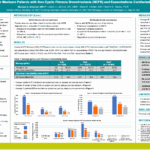
This gallery contains 1 photo.
Dr. Naomi Sacks, Vice President, BlueRidge Life Sciences’ Pharmaceutical Commercialization division, is attending the annual meeting of ISPOR (The Professional Society for Health Economics… read more

In the United States, the most common childhood central nervous system cancer is pediatric low-grade glioma, but there are no standardized coding definitions… read more
BlueRidge Life Sciences Pharmaceutical Commercialization’s Dr. Naomi Sacks’s work published in Obesity Science & Practice on behalf of The Obesity Society was recently… read more
A publication titled, “Benefit-Risk of Coffee Consumption and All-Cause Mortality: A Systematic Review and Disability Adjusted Life Year Analysis,” by ToxStrategies authors Candace Doepker, Naimisha Movva, Sarah Cohen [no longer with ToxStrategies], and Daniele Wikoff, has been published by Food and Chemical Toxicology. The paper is unique, in that a quantitative analysis was used within the benefit-risk assessment for foods (BRAFO) paradigm to assess potential harm and/or benefits of drinking coffee. In the paper, the BRAFO framework is applied to guide risk managers in decision making; in that context, the authors conclude that any policy that directs consumers to avoid drinking coffee may be a detriment to the overall health of the population, given the substantial potential benefits of coffee consumption on all-cause mortality for adults.
The published manuscript is available from the journal.
Several EpidStrategies scientists are among the collaborating authors of seven new studies on respiratory syncytial virus (RSV) published in a special supplement to the Journal of Infectious Diseases. The authors include Ms. Mina Suh, Ms. Naimisha Movva, Ms. Xiaohui Jiang, Ms. Heidi Reichert, and Ms. Lauren Bylsma, and the studies describe the morbidity and mortality burden of RSV among US-born infants and children under 5 years old.
RSV affects nearly all infants and children <5 years old. Our studies confirm that RSV is the leading cause of infant hospitalizations in the US. Even those born full term and otherwise healthy may be at risk of developing serious illnesses from RSV, including pneumonia. In addition, infants insured with Medicaid experience twice as many hospitalizations and emergency-room visits as privately insured infants, indicating potential health-care equity issues.
This journal supplement is the culmination of an ongoing research program that involved EpidStrategies scientists and academic and industry collaborators. Please contact Mina Suh (msuh@epidstrategies.com) for more information about this work.
The seven publications, listed below, are available from the journal via open access.
The Reproductive and Developmental Toxicology Specialty Section of the Society of Toxicology recently awarded its Scientific Achievement Award to ToxStrategies Senior Consultant Dr. John Rogers. The Section presents this award annually to recognize a member’s lifetime contribution to the field of reproductive and developmental toxicology, including such factors as leadership, impact on the field, and mentorship. In presenting the award during the Section’s annual meeting, held virtually on May 3, Dr. Atlee Watson recognized Dr. Rogers’ career longevity, beginning with service in the EPA in the 1980s, as well as his active leadership in SOT and the RDTSS, and his role in numerous scientific panels, seminars, and continuing education initiatives.
Concerns about potential health risks associated with low-level exposures to PFAS, along with their widespread uses and reported detections in various environmental media and products, are triggering regulation, litigation, and an urgent need to apply the best available science in evaluating the exposure, toxicology, and epidemiology to characterize potential human health risks. ToxStrategies and EpidStrategies have scientific expertise and advanced technical resources to assist clients in navigating the scientific environment and growing regulatory labyrinth associated with PFAS.
ToxStrategies’ and EpidStrategies’ cross-disciplinary capabilities include (but are not limited to) protocol development for PFAS extraction and migration from products, articles, and containers; assessment of fate and transport of PFAS; exposure and risk assessment of PFAS in environmental media; exposure and safety assessment of PFAS contained in wide variety of products, including foods, packaging, personal care products, cosmetics, health and beauty care products, and commercial/industrial products; in-depth PFAS toxicology knowledge; development of PFAS toxicity criteria and toxicokinetic modeling; critical assessment and systematic reviews of PFAS epidemiological studies and evidence to understand impact on health outcomes; and critical evaluation and systematic reviews of PFAS literature.
A team of ToxStrategies and EpidStrategies scientists are authors on a manuscript being published in Regulatory Toxicology and Pharmacology. The study examines current practices for assessing risk associated with environmental exposure to hexavalent chromium, comparing approaches based on margin of exposure to those using linear extrapolation. The authors assert that regulatory lung cancer potency estimates for Cr(VI) are based on outdated research, whereas more current mechanistic data support an epigenetic role for Cr(VI) and a non-mutagenic mode of action. The article cites a need for new epidemiology data to inform risk assessment of low-intensity exposures, concluding, however, that Cr(VI) in ambient air poses little concern for human health.
EpidStrategies, a division of ToxStrategies, Inc., has opened a position for an epidemiologist to join our team of epidemiologists and statisticians conducting systematic literature reviews and statistical analyses, and preparing manuscripts. We’re seeking a masters- or doctorate-level candidate with at least 3 years of professional experience conducting literature reviews, and strong writing and presentation skills. The successful candidate will enjoy EpidStrategies’ challenging and dynamic work environment, professional development opportunities, and competitive compensation and benefits. Interested? Please send a cover letter and CV to hr@epidstrategies.com.